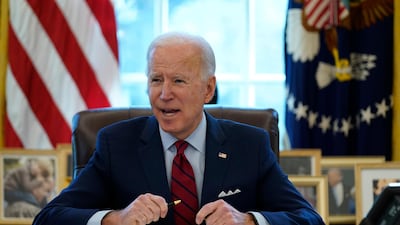Think tanks from the UAE, the US and Israel issued a Middle East policy guide for US President Joe Biden on Monday, in the latest sign of growing co-operation after last year’s normalisation pact.
Experts from the Atlantic Council in Washington, the Emirates Policy Centre in Abu Dhabi and the Institute for National Security Studies in Tel Aviv released a nine-point plan called, “How President Biden can Tackle the Middle East’s Biggest Problems”.
The three-page document, dealing with problems including Covid-19 and restraining Iran’s nuclear programme, comes after the Abraham Accord that normalised UAE-Israel ties last year and fostered greater engagement between the two countries.
The authors of the report – the Atlantic Council’s Kirsten Fontenrose, Emirates Policy Centre founder and director Ebtesam Al Ketbi and Institute for National Security Studies director Udi Dekel – said it was the first such collaboration.
They wrote about a “new regional landscape” since the Accord was signed at the White House in September and of co-operation between Israeli and Emirati think tanks, which was not previously possible.
“Through joint reports, conferences and online seminars, the partners intend to reinforce regional stability and promote mutually beneficial ties between Israel and the Arab world,” they wrote.
The policy advice would help Mr Biden to “score some early successes and avoid familiar minefields” in a region beset by wars in Yemen, Syria and Libya, and decades-old enmity between the Palestinians and Israelis, they wrote.
On Iran, the analysts advised Mr Biden to “consult closely” with America’s regional allies before re-entering the 2015 nuclear deal between Tehran and major world powers, from which former US president Donald Trump withdrew in 2018.
Washington should consult with its Gulf allies, Israel and others to address ballistic missiles, cyber warfare and other concerns that were left out of the original deal.
The Biden administration should strengthen co-operation between Israel and Arab states, including by emulating Israeli-UAE partnerships on vaccines against the coronavirus pandemic, the authors wrote.
On Palestinian-Israeli tension, the analysts urged Mr Biden to “create a pathway for diplomatic engagement” between the two sides and revive a peace process that was upended by Mr Trump’s pro-Israel deal making
“The alignment of many Arab, Israeli and American visions represents a new architecture in the Middle East,” the experts wrote.
“It signals a tectonic shift that creates new diplomatic options and geopolitical levers.”









































